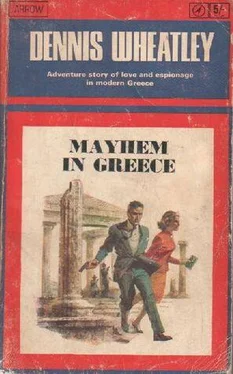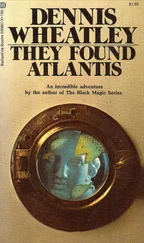Next morning at ten o'clock Robbie presented himself at the Czech Legation in Sekeri Street and adopted the same tactics as he had at the Greek Ministry of Commerce. He gave his name, asked to see the Minister, Mr. Havelka, and stated that, having no appointment, he was perfectly willing to await the Minister's convenience by sitting in the reception hall all day if need be.
On his name being sent upstairs, it rang a bell, as before, with the Minister's secretary. An enquiry came down if he were, in fact, a relative of the British Ambassador, and on his saying that he was Sir Finsterhorn's nephew he was told that the Minister would see him shortly. A quarter of an hour later he was taken up to the Minister's room.
Mr. Havelka proved to be a small, dark, bearded man, with piercing black eyes. He waved Robbie to a chair and, in halting English, asked the purpose of his visit.
Robbie replied in Czech that he was looking for a job, and it had occurred to him that there might be one going in the Czech Legation.
To attain his present position, Mr. Havelka had had to cultivate a poker face, but even he blinked at the idea of a nephew of the British Ambassador calmly asking to be taken on to his staff.
Instinctively, his head went down a little and his shoulders up, lest this strange animal should suddenly spring at him. Swiftly but cautiously his eyes ran over Robbie. Concluding that his visitor was neither mad nor dangerous, he stalled for time by asking: 'What qualifications have you?'
Robbie reeled off the languages he spoke. Havelka's brain was working like a dynamo. It was used to that. There had been times when, had it failed to do so, he would have found himself being marched off with the barrel of a pistol pressed hard into his back. He suspected a trap, but for once he was in a situation to which he had not got a clue. To gain further time in which to think, he pulled open a drawer in his desk, shuffled through some papers in it, and produced a document printed in Polish. Handing it to Robbie, he said: 'Please translate that into Czech.'
The document was about the exchange between the two countries of university students for vacation courses. The subject held no interest for Robbie, but he found that he was able to render quite a passable translation of it. While he slowly uttered the sentences, Havelka's quick, bird-like eyes continued to flicker over him.
The Czech was thinking: 'He must be an agent. No, he can't be. Even the British would not have the impudence to send one of their spies here openly to ask for a post. Perhaps he thinks himself a Communist. But if he is the Ambassador's nephew, that is hardly likely. Yet he might be. It has been reported that our propaganda is having excellent results among young people in England. The poor fools march now in their thousands to demand the banning of the bomb. If he is one of those, we could make good use of him. But how am I to know? Whatever I do, that swine Janos will say that I did wrong. If I send the fellow about his business, I shall be told that I missed a chance; if I take him on, Janos will rail at me for having endangered our security. How I wish that I could consult with Janos on occasions such as this. But no; he refuses all responsibility, maintains his role as butler all day and hands round the slivovitz with a sly smirk, then comes up here at night to pick holes in my day's work.'
When Robbie had finished the translation, the Minister said: 'Mr. Grenn, you are a nephew of the British Ambassador, so obviously of the capitalist class and, presumably, not a friend of Communism. What reason can you possibly have for seeking a position with us, which could carry only a very modest salary?'
This was the big fence, and Robbie knew it. For his years, he was remarkable in that he had never told a lie, or at least not more than a minor prevarication. Brought up and cared for solely by two adoring women, he had never had any cause to. Not until quite recently had he felt any urge to break away from his well-ordered life. He had never been forbidden to do anything except over-exert himself, he had never given way to any unbridled desire, he had never known the dread of being found out, or had any special secrets to keep. But after he had left Luke Beecham the previous evening, he had realized that he would never get anywhere with the Czechs unless he was prepared to lie to them.
It was more the strangeness of having to do so, rather than any definite moral scruple, that made him reluctant to abandon bis habit of replying frankly to any question put to him. Yet he realized that he must and, recalling a story that Sir Finsterhorn was fond of telling about Sir Winston Churchill fortified him in his determination.
The story was to the effect that, during the war, the Prime Minister was asked to approve a scheme which, by deceiving our enemies, would bring pain and grief to them. Naturally, he expressed himself in favour of it and, as it required co-ordination at the highest levels, he enthusiastically took charge of it himself.
The plan required that certain false information should be disseminated on the Continent, by means of broadcasts. Of these there were two kinds: those issued in numerous foreign languages by certain Intelligence departments, and those in English which were the normal News Bulletins of the B.B.C. The first had a basis of truth, but at times included lies deliberately calculated to mystify and mislead the enemy; on the other hand, it had definitely been laid down in a directive to the B.B.C. that its News Bulletins, on which the captive peoples of Europe had come to rely so greatly, should tell the truth, and nothing but the truth.
A high executive of the Broadcasting Services was ordered to attend a midnight War Cabinet meeting. With graphic gestures, the great Prime Minister outlined the plan, and told the visitor what was required of him.
Perhaps someone on the P.M.'s staff had blundered and had produced the wrong man. At all events, as the visitor listened to the forceful phrases directed at him, he grew paler and paler. At length he burst out:
'But, sir! To do as you suggest would be entirely contrary to our established policy. You cannot possibly ask me to tell lies like this.'
For a moment the Prime Minister stared in amazement at the poor wretch. Then he turned to those about him and cried in ringing tones: 'What is this? Am I confronted with a man who refuses to lie in the service of his country? Take him away! Take him away! Never let me see his face again.'
Sir Finsterhorn always concluded this story by saying that it was, no doubt, apocryphal, but Robbie had a passionate admiration for Sir Winston and liked to think that it was true. In any case, it had registered deeply in his slow mind a conviction that to lie on behalf of one's country was a matter for praise rather than blame. In consequence, he now set about doing so in no uncertain manner.
Having thought out carefully beforehand what he should say, he told Mr. Havelka that he had quarrelled with his uncle on political grounds and that, on learning of his leanings towards Communism, Sir Finsterhorn had thrown him out of the house. He added that he had a little money, but not much; so must quickly find a job to support himself. As his only asset was a thorough knowledge of Central European languages, he was hoping to find employment and congenial companionship in the Legation of one of the Communist countries.
By this time, the Minister had convinced himself that there was little to be feared from Robbie. Honesty radiated from him, and he was obviously a simple type of not very high intelligence. But he could speak Czech fluently, so should be capable of performing some not very exacting job of work. It struck Havelka, too, that it might even be counted as a feather in his cap to have, as he would put it to his superiors, suborned the nephew of the British Ambassador and be making use of him.
Читать дальше












